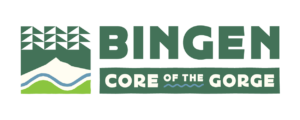Located in the heart of the Columbia River Gorge, Bingen is only 60 miles east of Portland, Oregon. The town site was platted in 1892 by Theodore Suksdorf, who named the town after Bingen-on-the-Rhine, Germany. It was incorporated in 1924.
Bingen continues to thrive and adapt as it has moved into the 21st century. Our new fire hall was dedicated in 2003 and our downtown revitalization project was completed in the summer of 2004. A new community center/civic complex is the next planned update for the City.
Bingen is located on State Route 14 with one of only two Amtrak stops between Vancouver and Pasco. The Columbia River can be accessed through the Port of Klickitat at Bingen Point. Bingen is a gateway for windsurfing, skiing, snowmobiling, kayaking, hiking, horseback trail riding, mountain biking, and fishing and hunting in the spectacular Columbia River Gorge Scenic Area.
Stop by and visit our small community and businesses.
Land Acknowledgement
The City of Bingen acknowledges the original inhabitants and traditional village sites of the land now occupied by Bingen. This land has been home to Indigenous People since time immemorial. These ancestral homelands extend beyond the soil and rock of the mountains and include Nch’i-Wána (The Big River). Tribes with historic ties to the area include the Cascades, Wasco, Wishram, Xwáłxwaypam (Klikatat), Wayám, and Yakama.1 Most descendants today are citizens of several federally-recognized Tribes, including the Confederated Tribes and Bands of the Yakama Nation, the Confederated Tribes of Siletz Indians, and the Confederated Tribes of Grand Ronde.
We acknowledge that our City’s history, like many others, is fundamentally tied to the first non-Native settlements in our region. We acknowledge the systemic policies of genocide, removal, relocation, and assimilation that have impacted – and continue to impact – Indigenous communities today. We recognize we have access this land because of the treaties forced upon its original inhabitants.
Acknowledging the Indigenous communities whose lands we occupy is the first step in raising awareness about our collective history, their cultures and the continued injustice toward Indigenous populations today. We encourage you to visit the links to each Tribe above to learn more about the ancestral stewards of this land.
Our Land Acknowledgment efforts are an ongoing and evolving project. If you see any missing information, Tribe acknowledgments or otherwise, please do not hesitate to share this information with us so that we may continue updating this page and be as comprehensive, accurate and inclusive as possible. Thank you.
